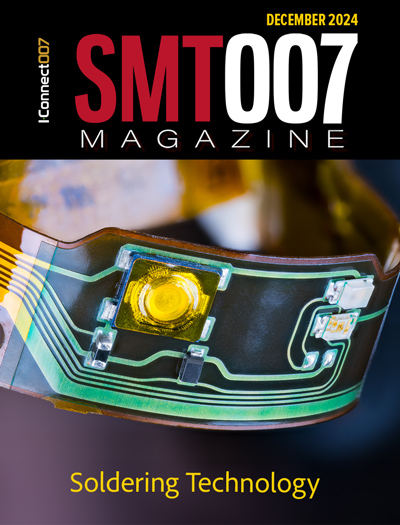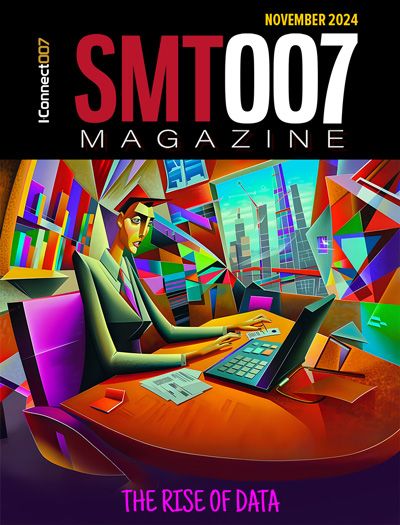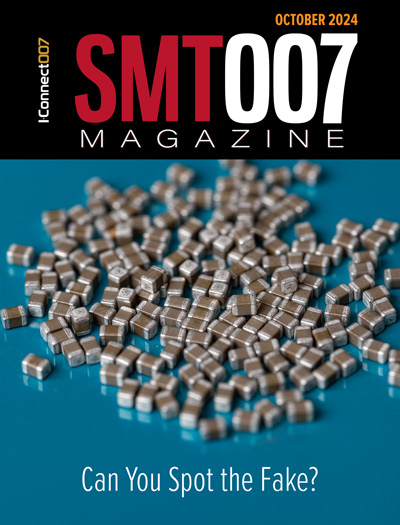-

- News
- Books
Featured Books
- smt007 Magazine
Latest Issues
Current Issue
Soldering Technologies
Soldering is the heartbeat of assembly, and new developments are taking place to match the rest of the innovation in electronics. There are tried-and-true technologies for soldering. But new challenges in packaging, materials, and sustainability may be putting this key step in flux.

The Rise of Data
Analytics is a given in this industry, but the threshold is changing. If you think you're too small to invest in analytics, you may need to reconsider. So how do you do analytics better? What are the new tools, and how do you get started?

Counterfeit Concerns
The distribution of counterfeit parts has become much more sophisticated in the past decade, and there's no reason to believe that trend is going to be stopping any time soon. What might crop up in the near future?
- Articles
- Columns
Search Console
- Links
- Media kit
||| MENU - smt007 Magazine
PNNL Kicks Off Multi-Year Energy Storage, Scientific Discovery Collaboration with Microsoft
January 15, 2024 | PNNLEstimated reading time: 3 minutes
The urgent need to meet global clean energy goals has world leaders searching for faster solutions. To meet that call, the Department of Energy’s Pacific Northwest National Laboratory has teamed with Microsoft to use high-performance computing in the cloud and advanced artificial intelligence to accelerate scientific discovery on a scale not previously demonstrated. The initial focus of the partnership is chemistry and materials science—two scientific fields that underpin solutions to global energy challenges.
“The intersection of AI, cloud and high-performance computing, along with human scientists, we believe is key to accelerating the path to meaningful scientific results,” said PNNL’s Deputy Director for Science and Technology Tony Peurrung. “Our collaboration with Microsoft is about making AI accessible to scientists. We see the potential for AI to surface a material or an approach that is unexpected or unconventional, yet worth investigating. This is a first step in what promises to be an interesting journey to accelerate the pace of scientific discovery.”
How is this AI development different?
The two organizations are laser-focused on leveraging what AI does best—synthesizing billions of information bits—more than any human could possibly absorb—and quickly presenting conclusions based on its analysis. Microsoft’s Azure Quantum Elements platform uses advanced AI models purpose-built to aid scientific discovery. PNNL researchers are now testing its ability to identify promising new materials for energy applications. The two organizations have committed to leveraging advanced AI models to find viable new materials and the chemistries needed to provide energy-on-demand while preserving the Earth’s resources for future generations.
“We are at the dawn of a new era of scientific discovery that can transform our world for the better. With novel AI and hyperscale capabilities, we can speed up research and unlock the discovery of new molecules that can address some of the most pressing issues of our time, from clean energy to eliminating toxic chemicals and beyond. We are honored to work with world-class scientific institutions like Pacific Northwest National Laboratory. Our breakthrough in using AQE to find new battery materials is just one of the many examples of how our innovative approach to materials research can improve our daily lives,” said Jason Zander, Executive Vice President of Strategic Missions and Technologies at Microsoft.
Energy storage as a test case
The newly executed agreement between the two organizations formalizes the next phase of PNNL’s ongoing relationship with Microsoft. Over the next several years, the Microsoft-PNNL partnership envisions a transformative journey toward pioneering breakthroughs in scientific discovery and sustainable energy—leveraging cutting-edge computing and artificial intelligence technologies to address some of the world's most pressing challenges. The partnership will have an initial emphasis in computational chemistry and material science.
Read more about how PNNL created these new energy storage materials in PNNL’s Energy Sciences Center. There, materials scientists Vijay Murugesan, Shannon Lee, Dan Thien Nguyen and Ajay Karakoti synthesized and tested the new compound. The entire process, from receiving the simulated candidates through producing a functioning battery, took less than nine months, a blink of an eye compared with traditional methods. To make the compound competitive with published benchmarks, additional optimization is required and initial investigations suggest new pathways to further explore the functional properties of the new material.
“The new battery results are just one example—a proof point if you will,” said PNNL’s Chief Digital Officer Brian Abrahamson. “We recognized early on that the magic here is in the speed of AI assisting in the identification of promising materials, and our ability to immediately put those ideas into action in the laboratory. We are excited to take this to the next level in the partnership between Microsoft and PNNL. We plan to push the boundaries of what's possible through the fusion of cutting-edge technology and scientific expertise.”
Suggested Items
Scanfil Suzhou Factory Receives Sustainability Award from Thermo Fisher Scientific
12/16/2024 | ScanfilThermo Fisher Scientific granted a Sustainability Award to Scanfil’s Suzhou factory at the APAC Sustainability Summit. This accolade highlights Suzhou’s dedication to sustainable practices.
IPC, FED Partner for New Design Conference in Vienna
12/12/2024 | Andy Shaughnessy, Design007 MagazineIPC and its German partner FED have teamed up to create a new PCB design conference in Vienna, Austria. The Pan-European Electronics Design Conference (PEDC) is scheduled for Jan. 29-30 at the NH Danube City hotel in Vienna. IPC’s Peter Tranitz, one of the show organizers, discussed how this new show came about, pointing out that, unlike many of the regional conferences in Europe, PEDC will host curated, peer-reviewed presentations, not promotional content or product pitches. Will PEDC become an annual event?
Argonne, RIKEN Sign a Memorandum of Understanding in Support of AI for Science
04/16/2024 | BUSINESS WIRELeaders in high performance computing in the U.S. and Japan have signed a memorandum of understanding (MOU) establishing a cooperative relationship in support of artificial intelligence (AI) computing projects.
NASA Selects First Lunar Instruments for Artemis Astronaut Deployment
03/27/2024 | NASANASA has chosen the first science instruments designed for astronauts to deploy on the surface of the Moon during Artemis III. Once installed near the lunar South Pole, the three instruments will collect valuable scientific data about the lunar environment, the lunar interior, and how to sustain a long-duration human presence on the Moon, which will help prepare NASA to send astronauts to Mars.
KIOXIA, HPE Team Up to Send SSDs into Space, Bound for the International Space Station
02/27/2023 | Business WireKIOXIA America, Inc. announces its proud participation in the Hewlett Packard Enterprise (HPE) Spaceborne Computer-2 (SBC-2) program. As part of the program, KIOXIA SSDs provide robust flash storage in HPE Edgeline and HPE ProLiant servers in a test environment to conduct scientific experiments aboard the International Space Station (ISS).


